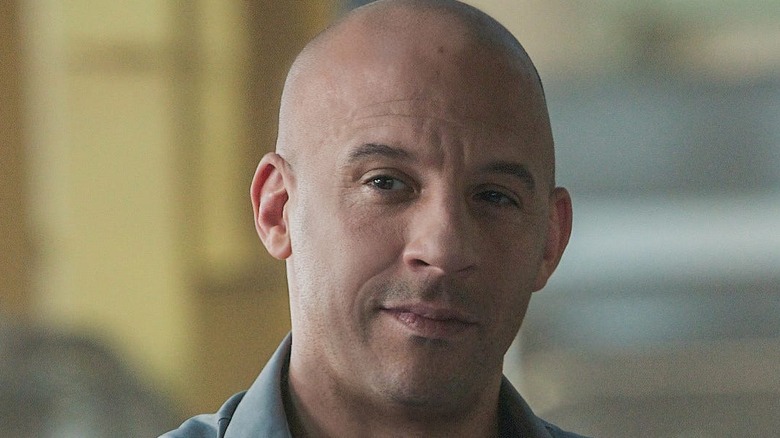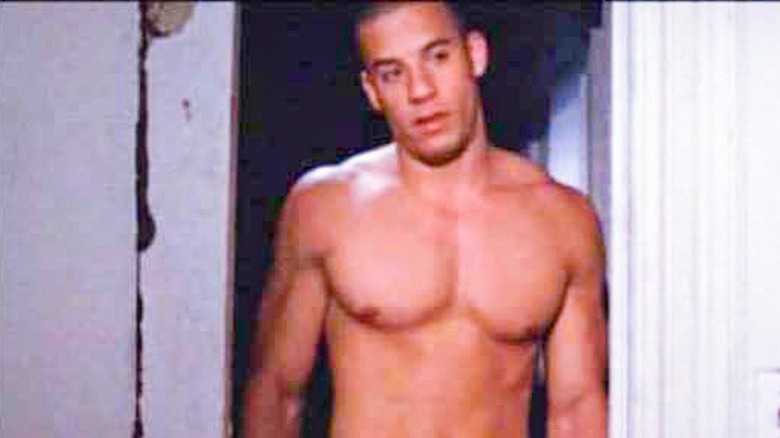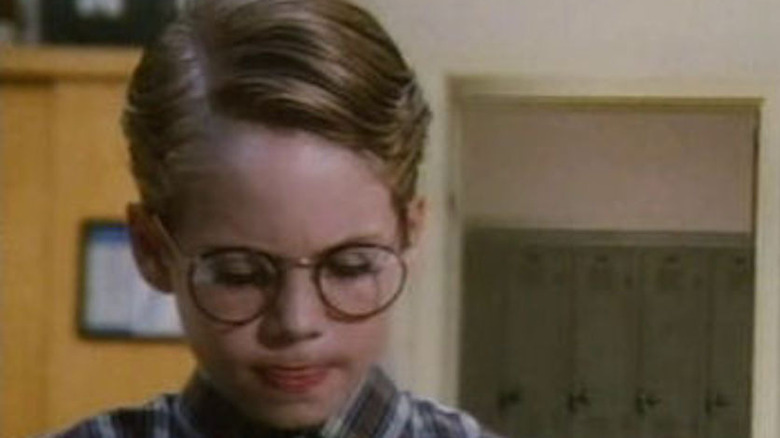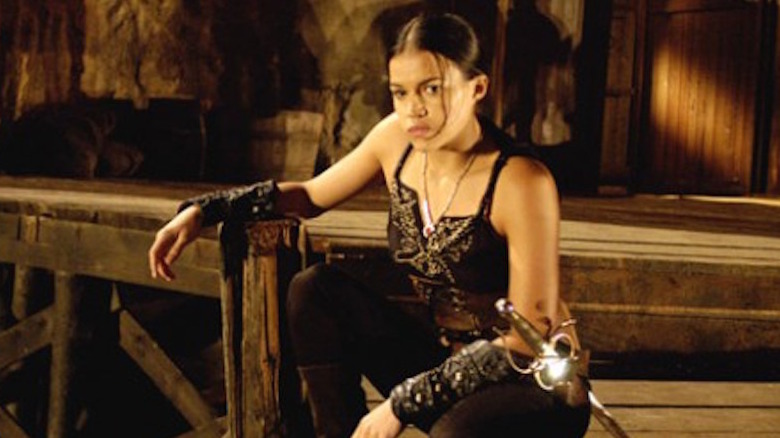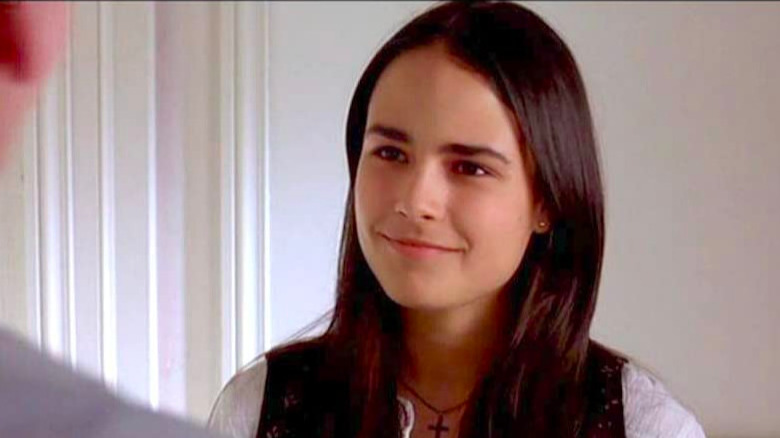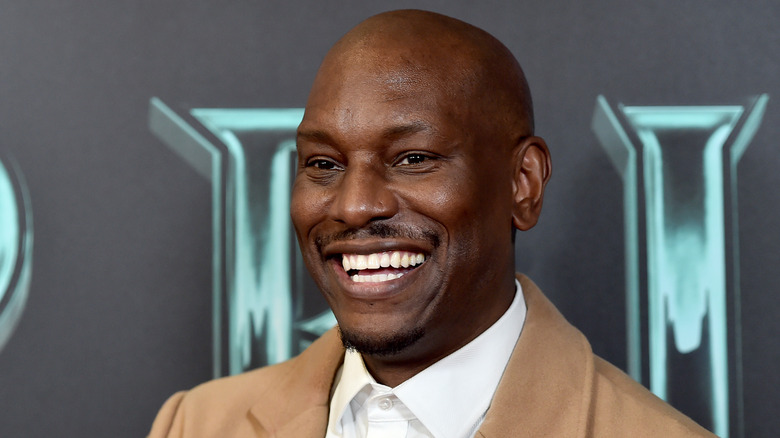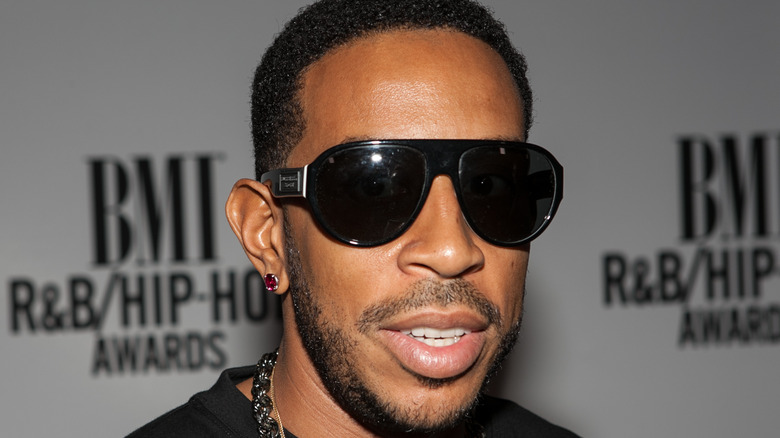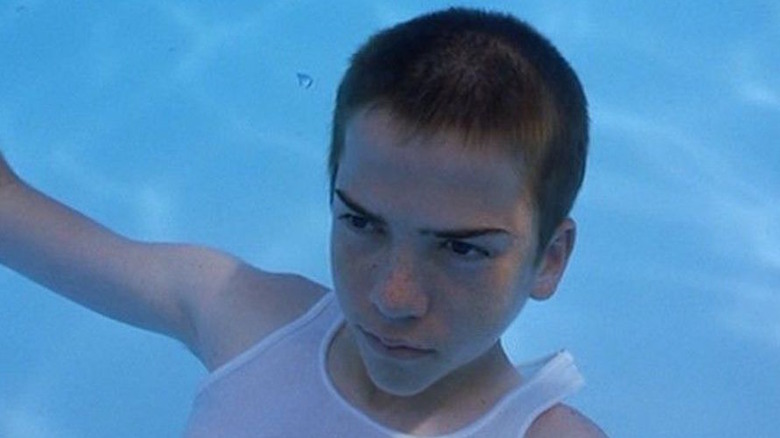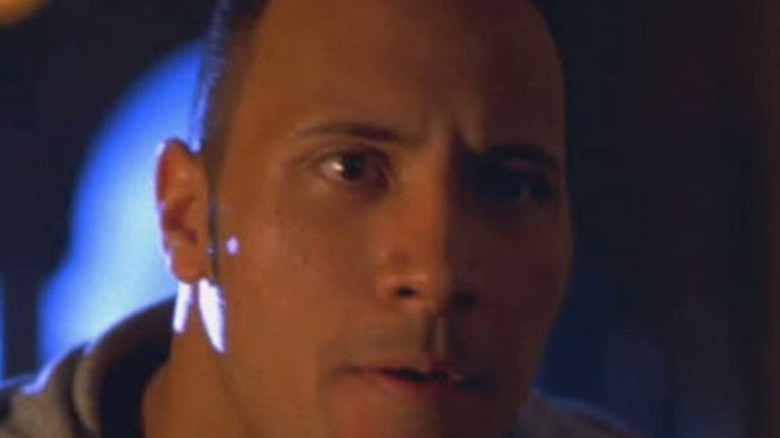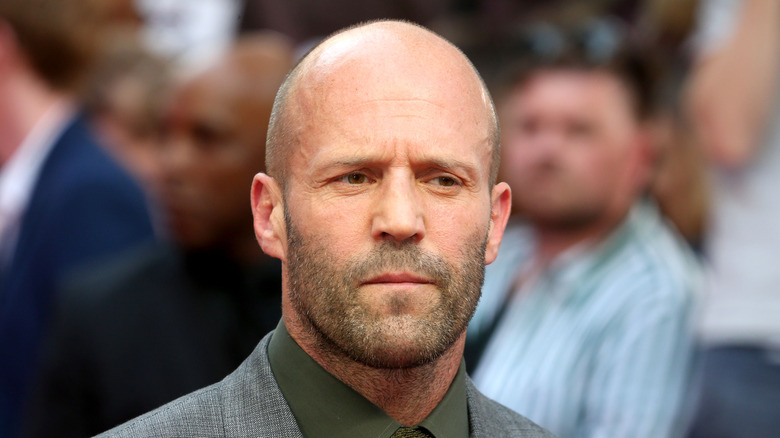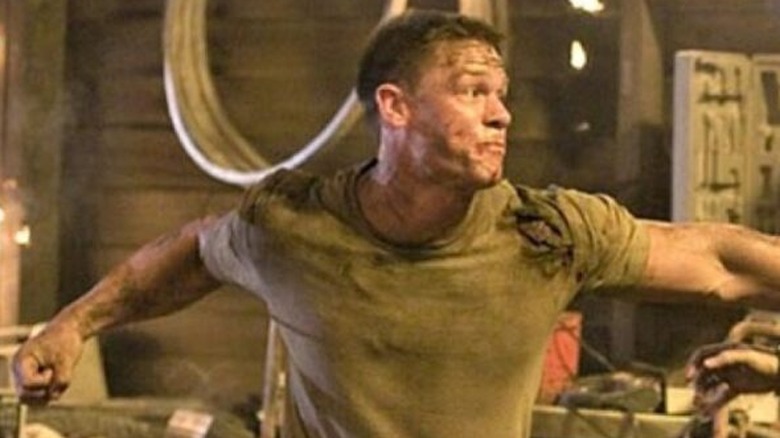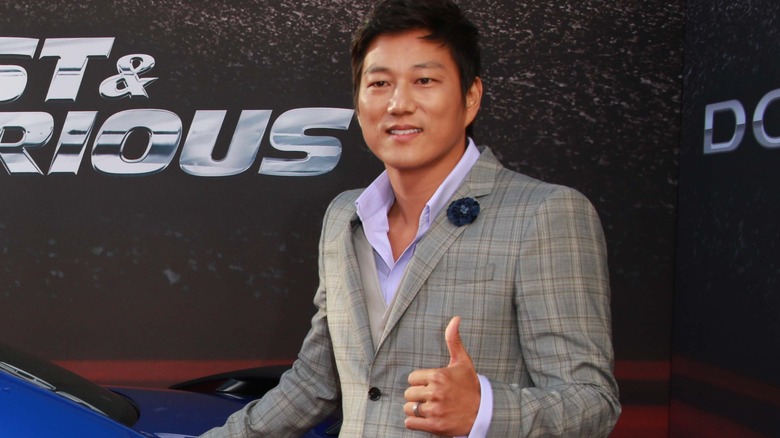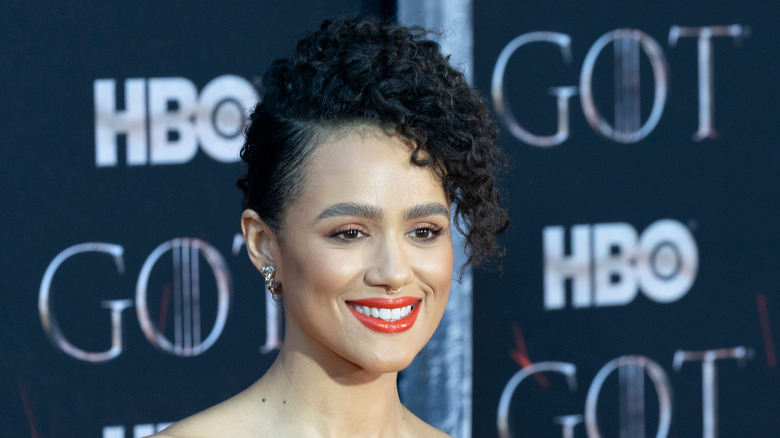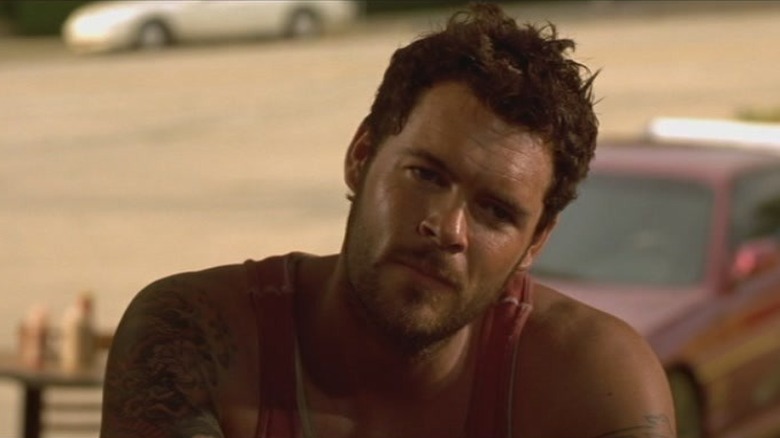Early Roles That Fast And Furious Actors Would Like You To Forget About
The "Fast and Furious" movie franchise has netted Universal Pictures more than $6 billion in ticket sales, surpassing such familiar franchises as "The Lord of the Rings" and "Transformers" in total box office take. The series — which also encompasses short films, a TV series, video games, soundtracks, and theme park attractions — has minted an ever-growing cast of stars, several of whom have gone on to enjoy screen success outside the "F&F" universe.
"F&F" has transformed Vin Diesel, who stars as the leader of the series' team of street racers turned spies for hire, into a brand of his own, with connections to the Marvel Cinematic Universe, the "Avatar" films, and his own side franchises ("XXX" and "Riddick"). Its popularity has also allowed Universal to draw in major performers like Dwayne Johnson, Charlize Theron, Gal Gadot, and Jason Statham to the "F&F" fold.
Though the stars of "F&F" enjoy the global attention afforded by the franchise, they haven't always basked in the spotlight. All of the "F&F" players have at least one film title in the rearview mirror of their careers that took a beating from critics and/or ticket buyers. These films remain some of their least-seen, least-discussed efforts, aka the early roles that "Fast and Furious" actors would really like you to forget.
Vin Diesel directed the Scorsese-lite Strays
In 1998, CBS series "48 Hours" ran a news story covering Hollywood wannabes trying desperately to break through. Infamously, it featured both Vin Diesel (soon to make a breakthrough with "Saving Private Ryan") and "Requiem For a Dream" director Darren Aronofsky, then promoting his debut film "Pi."
But Diesel might never have been noticed by CBS unless he made a bid to establish himself as an actor and filmmaker with his 1995 short film "Multi-Facial." A semi-autobiographical story about an actor who, like Diesel, found that his multi-racial heritage made it difficult to him to fit within Hollywood casting agents' cookie-cutter notions about ethnicity, the short played at the Cannes Film Festival and drew the attention of Steven Spielberg, who cast Diesel "Ryan."
In 1997, Diesel made his feature-length debut as a filmmaker with "Strays," a low-budget indie drama about a bouncer/small-time drug dealer (played by Diesel) seeking a more meaningful life than the one afforded by hanging around with his knuckle-headed pals (including a young Mike Epps). Diesel, who also wrote and co-produced the film, showed an aptitude in front of and behind the camera, but struggled to escape the weight of the film's pretensions. Broad pronouncements like "life is a matador" are offered up (repeatedly) as profound wisdom, while the shenanigans of Diesel's pals appear designed to parallel the male bonding rituals in Martin Scorsese's "Mean Streets," but hew closer to the empty-headed antics of "Entourage."
Diesel shouldn't be embarrassed by "Strays" — it's an ambitious, self-funded effort by a young filmmaker with a burning desire to speak his mind. Although it may have fallen short of saying anything meaningful or novel, it did suggest that Diesel could carry a picture, which he soon underscored with "Pitch Black" and "The Fast and the Furious."
When Paul Walker met the Monster in the Closet
Prior to his untimely death in 2013, Paul Walker enjoyed a run as a leading man and supporting player in numerous films during the late '90s and 2000s, including five entries in the "Fast and Furious" franchise, as well as "Joy Ride," "Into the Blue," and "Flags of Our Fathers." But every movie star's career has to start somewhere, and for Walker, that launching point was the 1986 horror-comedy "Monster in the Closet."
The only film from Bob Dahlin (an assistant director for Robert Altman, Alan J. Pakula, and on numerous television movies), "Monster" spoofs creature feature cliches with its story about a rash of murders committed inside closets. Reporter Donald Grant digs into the story, and with the help of Denise DuBarry and her smarty-pants kid (Walker) — known as "Professor" — they discover that a monster lurking in closets is responsible for the killings.
"Monster in the Closet" is broad and goofy, and takes itself seriously in very few scenes, which undoubtedly brought it to the attention of its distributor, Troma Films, the cult movie production company responsible for "The Toxic Avenger" and other deliberately "bad" genre titles. "Monster" fits perfectly into Troma's screwy aesthetic; it's atrocious, but doesn't care about your opinion. That attitude was probably a relief to actors like Walker, who undoubtedly saw "Monster" as an unfortunate bump on the road to fame.
Michelle Rodriguez hunted video game vampires in BloodRayne
After her award-winning turn as a boxer in "Girlfight," Michelle Rodriguez had a window where was in demand as a lead and supporting player in features and on television. Projects like "The Fast and the Furious" — which began her long run as Letty Ortiz — "Resident Evil," "Lost," and "Avatar" were some of the most popular pop culture triumphs of the time; projects like "Battle in Seattle," "S.W.A.T.," and "Battle Los Angeles" were not, but were lapped by an infamous live-action adaptation of the video game "BloodRayne."
One of several features based on games from notorious filmmaker Uwe Boll — the man responsible for such head-scratching projects as "Alone in the Dark," "Postal," and "In the Name of the King" — "BloodRayne" starred "Terminator 3" actor Kristanna Loken as a human/vampire hybrid looking to unseat her father (a seriously slumming Ben Kingsley) as the leader of the undead. Rodriguez was one of three vampire killers (with Michael Madsen and Matthew Davis) who aid Rayne in her quest.
Boll's typical prescription for features — a mix of junk special effects, exploitative elements (read: lots of gore and nudity), and a tone that wavers between camp and naiveté — would ultimately render "BloodRayne" calorie-free late-night streaming fare; Rodriguez does herself no favors with an unplaceable accent, which helped her one of the film's six Razzie nominations.
Jordana Brewster got lost in the Invisible Circus
The same year Jordana Brewster debuted as Mia Toretto in "The Fast and the Furious," she also starred in "The Invisible Circus," an adaptation of the 1995 novel of the same name by Jennifer Egan. Brewster starred as Phoebe, an American teenager living in 1976 who travels to Europe in order to understand the facts behind the mysterious death of her sister, played by Cameron Diaz. The journey introduces her to Diaz's boyfriend (future "Dr. Who" star Christopher Eccleston), who reveals her sister's path from '60s counterculture radical to bomb-throwing terrorist.
Brewster, who'd only appeared in "As the World Turns" and Robert Rodriguez's "The Faculty" prior to "The Invisible Circus," might not have been fully prepared to handle the emotional depth of her character (she's since become a capable performer in dramas like "The People vs. O.J. Simpson" and comedy efforts like "Chuck"). The dialogue, dripping with zeitgeist-defining statements ("Something's happening, everything's changing!"), certainly doesn't help; the same goes for director Adam Brooks' bland direction and the film's sightseeing approach to European culture and history.
Tyrese is a brief note in the MTV TV movie Love Song
Tyrese Gibson has enjoyed fame and success on multiple fronts — a slew of Top 20 and Grammy-nominated songs and albums, a best-selling author, and the star of two popular action movie franchises, "Fast and Furious" and "Transformers." But not every Tyrese project has been a hit. This includes his screen debut in the 2000 TV movie "Love Song," which preceded his first lead role in John Singleton's "Baby Boy."
"Love Song," which originally aired on MTV (where Gibson was a VJ at the time of its release) paired R&B diva Monica with a pre-"Leverage" Christian Kane as star-crossed lovers (she's a sheltered, upper-middle-class college girl, he's a downtown jazz musician) whose romance sends shockwaves through their respective worlds. Tyrese's appearance is a glorified cameo, as is a brief turn by TLC co-founder Chilli.
Though directed with style by award-winning filmmaker Julie Dash, "Love Song" can't overcome its made-for-TV origins, which were painfully evident in its plot and dialogue (emotions are delivered with all-caps dialogue or lingering looks). As such, it's best remembered as a footnote on Tyrese's resume.
Ludacris made his screen acting debut opposite Snoop and Dr. Dre in The Wash
In addition to his career as a recording artist, which generated seven Top 5 albums between 2000 and 2015, Chris "Ludacris" Bridges is also an award-winning actor with credits that include "Hustle & Flow," "Crash," "New Year's Eve," and a long-running stint as technical expert Tej Parker in the "Fast & Furious" franchise. He's also a television producer (the critically praised Netflix children's series "Karma's World"), record label owner, entrepreneur, and philanthropist. But before earning the majority of these laurels, Ludacris was among a large number of celebrities who contributed cameo appearances to the 2001 comedy "The Wash."
A loose adaptation of the 1976 comedy "Car Wash" from music producer-turned-filmmaker DJ Pooh (the "Friday" franchise), "The Wash" stars Dr. Dre and Snoop Dogg as cash-adverse pals who take up jobs at a local car wash to meet their rent. The location's staff and customers are a cross-section of comedy and hip-hop stars, including Eminem, George Wallace, Bruce Bruce, Xzibit, and "Tiny" Lister, as well as oddball cameos by (among others) Shaquille O'Neal, Pauly Shore, celebrity pimp Don "Magic" Juan, and Tommy Chong. Despite their combined efforts, none of the "Wash" cast can elevate the material beyond its shambling, seemingly improvised dialogue and jokes based on characters' weight, body parts, and intimate proclivities.
As for Ludacris, he appears briefly as a customer who becomes irate over the use of Windex on his tire rims. Dr. Dre's attempt to appease him with a free car wash only encourages another torrent of invective, before Dre brings the scene to an end by simply walking out of frame. It's that kind of movie.
Lucas Black got Crazy in Alabama
Actor Lucas Black ("NCIS: New Orleans") briefly took the wheel for the "Fast and Furious" franchise) as street racing fan Sean Boswell in its third entry, "Tokyo Drift." Though less well received at the time of its release than its predecessor, the film has gone on to find favor with franchise devotees, and Black reprised his role in "Furious 7" and "F9." Prior to his turn as Boswell, Black earned critical praise for his performances in "Sling Blade" and "Ghosts of Mississippi," and later appeared in "Cold Mountain," "Friday Night Lights," "Jarhead" and "42."
One of Black's lesser-known titles – and deservedly so – is "Crazy in Alabama." The 1999 feature, which marked the directorial debut of Antonio Banderas, divides its screen time between the misadventures of Southern belle (and Banderas's then spouse) Melanie Griffith, who heads out to Hollywood with her abusive husband's head in a box (!), and the murder of a young Black boy who attempted to integrate his small Alabama town's swimming pool. Black, as both Griffith's nephew and the witness to the boy's murder, does what he can to unify the film, which veers wildly from broad comic to social commentary, and fails to address either with the humor or gravity each requires.
Dwayne Johnson avoided a career mugging after Longshot
In 2001, the same year he made his much-publicized appearance as The Scorpion King in "The Mummy Returns," Dwayne Johnson also turned up briefly as a mugger in "Longshot," a laugh-free comedy/vanity project produced and co-written by Lou Pearlman, the infamous manager of such millennial pop favorites as the Backstreet Boys, Britney Spears, and 'N SYNC.
Spears and members of the latter act, as well as performers from such lesser-known Pearlman groups as LFO, Take 5, and Innosense all turn up in "Longshot," which concerns a pair of brothers (Joey Sculthorpe and co-writer Tony DeCamillis) pulled into an inordinately complex scheme by bad guy Paul Sorvino to gain insider trading info on a company owned by Hunter Tylo's late husband.
Johnson's screen time is mercifully brief — he threatens Sculthorpe before being improbably brought down by his scrawnier co-star — and he emerged largely unscathed from the early appearance, going on to enjoy fame as a wrestler, producer, and star of "Jumanji," "Moana," and the "F&F" franchise, including his own spin-off feature, "Hobbs & Shaw." Much of that has to do with the fact that "Longshot" is very difficult to see; it briefly played theaters in Germany before being exiled to home video.
That must have been a relief to the cast, which includes a pre-solo-stardom Justin Timberlake alongside a surreal supporting cast that includes Art Garfunkel (Pearlman's real-life cousin), Gilbert Gottfried, Dustin Diamond, Danielle Fishel, Kenny Rogers, Jermaine Jackson, Los Angeles Lakers announcer Chick Hearn, and Harry Wayne Casey of K.C. and the Sunshine Band.
Jason Statham should have turned down Turn It Up
English action star Jason Statham added another successful film franchise to his resume when he took on the role of former MI6 agent Deckard Shaw in "Fast & Furious 6." Initially depicted as a villain, Shaw eventually joins the side of the angels (or at least, Dom's crew) in "The Fate of the Furious," which led to his own spin-off movie entitled "Hobbs & Shaw," alongside Dwayne Johnson's Luke Hobbs.
Statham has a long list of movies to his name, including his "Transporter" franchise and a major role in the "Expendables" series, as well as "Crank," "The Italian Job," "Lock, Stock and Two Smoking Barrels," and "The Meg." Given his almost ceaseless pace, he's also racked up a few duds, including "Chaos" and "Killer Elite." In terms of movies he'd probably like to forget, Statham has his pick of Uwe Boll's "In the Name of the King," John Carpenter's "Ghosts of Mars," and "Turn It Up," a little-known music industry drama which cast him as a shadowy drug dealer who ensnares aspiring rapper Pras (of the Fugees) and his sidekick (Ja Rule).
"Turn It Up" stands out among that unfortunate pack for its brazenly clichéd storyline: Pras wants to go straight and be a star but can't give up that thug life; Vondie Curtis-Hall is his long-lost musician dad who begs him to clean up his act for his unborn child, and so on. Pras and Rule are uniquely vacuous and aggravating heroes, respectively, which leaves Statham to hold viewers' interest.
John Cena's first movie tour of duty was in The Marine
Wrestling champion John Cena certified his movie star status with a string of eclectic features and TV projections, including "F9," which cast him as long-lost Toretto brother Jakob, as well as "The Suicide Squad" (and its spin-off series "Peacemaker"), "Bumblebee," and "Trainwreck." Lost in this slew of films are Cena's earliest screen roles in two WWE-produced features: "The Marine" and "12 Rounds," both of which leaned heavily on the actor's man-mountain physique and ability to withstand abuse.
"The Marine," from 2006, required little else from Cena, whose turn as a military hero in pursuit of the thugs that kidnapped his wife (Kelly Carlson) is defined by his skill at weaponry, hand-to-hand combat, and jumping out of buildings. In that capacity, Cena is solid (literally and figuratively), but the snarky sense of humor that he displayed in "Suicide Squad" and other film projects has no outlet in the script by Alan B. McElroy (the "Wrong Turn" franchise); as a result, he's completely outshined by his future "Peacemaker" co-star Robert Patrick, who plays the head of the criminal crew that abducts Carlson. In typical fashion, Patrick throws himself into his role, biting off huge chunks of the scenery and capturing viewers' attention with obvious relish.
Sung Kang stepped away from the driver's seat for Forbidden Warrior
Actor Sung Kang made his debut as Han Lue in the 2002 indie "Better Luck Tomorrow," which marked the solo feature film directorial debut of frequent "Fast & Furious" helmer Justin Lin. Lue was introduced to the "F&F" universe in Lin's "Tokyo Drift" and returned to the series for its fourth entry ("Fast & Furious") before appearing to die at the end of "F&F 6," which depicted the character's death in "Tokyo Drift." His popularity among franchise fans brought him back from the grave at the end of "F9."
Kang worked tirelessly between "F&F" assignments, turning up in features like "Live Free or Die Hard" and "Ninja Assassin" and on series like "Power" and "Obi-Wan Kenobi." Lost in this wealth of projects is "Forbidden Warrior," a nod to old-school martial arts action films by veteran stuntman Jimmy Nickerson. The plot pits Marie Matiko's swordfighting specialist against warriors dispatched by evil warlord Woon Yung Park. Chief among these is Park's reluctant son, played by Kang.
"Forbidden Warrior" isn't dreadful; the martial arts and wuxia scenes are competently choreographed, and there's a touch of humor in Matiko's trio of oafish sidekicks. The issue with the film lies more in the fact that it's nothing you haven't seen before: there are dozens of martial arts and fantasy films from Hong Kong that cover this territory with greater visual style and fighting flair. Kang looks comfortable outside of a car, but the movie itself doesn't give him enough to do.
Nathalie Emmanuel escaped Twenty8K before joining The Fate of the Furious
British actress Nathalie Emmanuel (Missandei on "Game of Thrones") joined the "Fast and Furious" crew in "Furious 7," which cast her as Ramsey, the creator of the God's Eye tracking program. After her rescue from mercenary Mose Jakande, by Dom, she teamed with Tej as a tech adviser in "The Fate of the Furious" and "F9," and is slated to return for "Fast X."
Emmanuel's film and television career is filled with an impressive mix of films and TV series: in addition to "Game of Thrones," she also appeared on the popular UK soap opera "Hollyoaks," the "Four Weddings and a Funeral" miniseries, and lent her voice to Deet for "The Dark Crystal: Age of Resistance," while feature credits include the "Maze Runner" features "The Scorch Trials" and "The Death Cure," as well as "Army of Thieves" and Francis Ford Coppola's upcoming "Megalopolis."
Her first big screen credit, however, is most likely her most forgettable. The 2012 thriller "Twenty8K" isn't bad by any means — it's a competently made action-drama set prior to the Summer Olympics in London, and stars Parminder Nagra ("Bend It Like Beckham") as a fashion executive who returns home to the UK after her brother is implicated in a shooting. Her investigation leads to the revelation of a conspiracy between the titular gang and the local police. Nagra is joined by a solid cast that includes her "Maze Runner" co-star Kaya Scodelario and Stephen Dillane, but the end result is devoid of suspense or surprises, and plays largely like episodic TV (no surprise, given that its writers are all small screen vets).
Matt Schulze was just one of the Boys and Girls
Actor Matt Schulze played the perennially ill-fated Vince in "The Fast and the Furious" and "Fast Five," which found him on the wrong end of an opponent's gun on two separate occasions before his death at the hands of Hernan Reyes' loyal soldier, Zizi, in the latter film (he later appeared in archival footage in "Fast & Furious 6"). Schulze appears to have taken himself out of the limelight after "Fast Five" — his last screen credit to date was the 2018 Johnny Knoxville comedy "Action Point" — but prior to that project, he enjoyed steady work in high-profile features like "Blade," "The Transporter" (with Statham) and numerous independent films.
The low point on Schulze's filmography isn't one of the latter, which is comprised of anemic actioners like the "Fast" knock-off "Torque" or the glum geekfest "The Heart is Deceitful Above All Things." Rather, it's the 2001 comedy "Boys and Girls," a vehicle for Freddie Prinze, Jr., and Claire Forlani, who are forced to meet cute and break up over and over again alongside Jason Biggs, who plays Prinze's hormonally-overcharged sidekick. Very little is funny, romantic, or sexy in the film, which was clearly designed to piggyback on the success of "She's All That." Both films share Prinze and director Robert Iscove, as well as a left-field musical number, but possesses none of that picture's guileless charm. Schulze has only a minor role in the film, of which he was undoubtedly glad.
